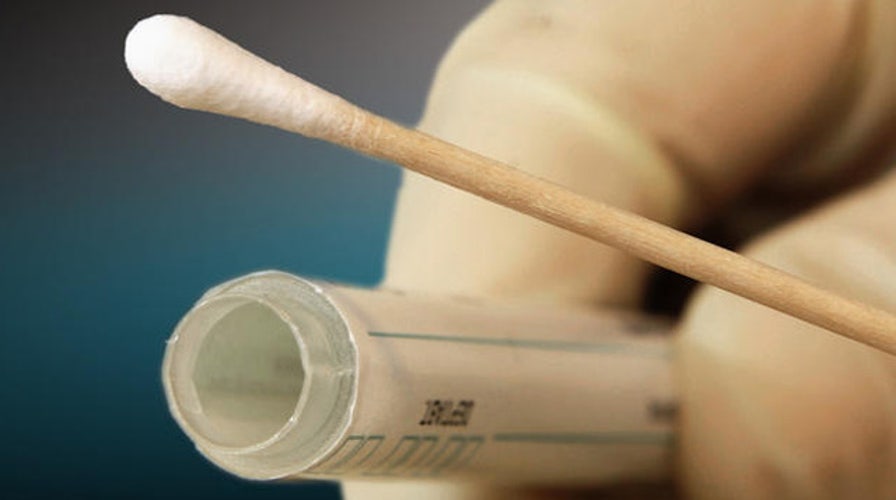Report: Police departments creating their own DNA databases
Local law enforcement agencies amassing collections of potential suspects?
This is a rush transcript from "The Five," June 13, 2013. This copy may not be in its final form and may be updated.
KIMBERLY GUILFOYLE, CO-HOST: While the government has been busy snooping up our phone and Internet records, police may be collecting something much more personal. Police departments around the country have been amassing their own databases of potential suspects. Now, in some cases, the DNA of innocent victims of crime are being saved. So, is this legal? Yes, according to the Supreme Court if you want to go by what they say. They said it's OK.
Now, as a former prosecutor, I like the collection of evidence because I want to make sure we have the right person behind bars. I want to make sure we are prosecuting the right person and I want to get that guy on the cold case rape from 14 years ago. That's kind of my approach.
There have been a lot of cases we have been able to solve now in district offices across the country. But at a certain point does it go too far? What about collecting evidence of innocent victims, from the crime scene, somebody who is raped, or mugged, or assaulted or home invasion or something and you collect their DNA?
DANA PERINO, CO-HOST: Well, what if you're caught -- my question is this is for suspects as well. Even if you had nothing to do with it, your DNA is on file. I don't see like -- where are the people who are mad at the NSA, they should be mad about this. And the Supreme Court just approved this one as well.
The other thing that bothers me about is it's not just one entity controlling the information. It is al of the different police jurisdictions. Cities and states have different rules. And I don't know what their safe guards are to make sure that people who are innocent but maybe caught up in a dragnet aren't violated in the future.
GUILFOYLE: Right. So, this has people that are arrested, so, what we used to call, you know, prosecuting cases, someone who has contacts in the system. So, if you are at the scene of a crime and three guys have supposedly allegedly committed a crime or suspects, they are going to get there three and say perhaps only two end up being prosecuted. One was in the wrong place at the wrong time, but they still got his goods.
Five years down the road, if he is in fact hanging out with the same people and does something else, then they're going to have it and will come up with a positive hit in the system is how that works.
Eric?
ERIC BOLLING, CO-HOST: Can I just point one, Dana? So, I'm the one, I have a problem with the NSA and I don't have a problem with this because of the fact that they are suspects. There is probable cause. They may or not be guilty. They are not tried yet.
(CROSSTALK)
JUAN WILLIAMS, CO-HOST: I am suspicious of you.
BOLLING: Here is the difference. Not taking DNA of the whole neighborhood.
WILLIAMS: Wait a minute, a suspect, Kimberly says that kid looks suspicious to me so she can take his DNA?
BOLLING: Suspect in a crime.
GUILFOYLE: We have to get everybody and we have two seconds.
WILLIAMS: No.
GUTFELD: Technology. It's like terror. We can't keep up with it. So, we have to figure out how to change with it. DNA has freed, as far as I can tell freed as many people as it has imprisoned. So, it cuts both ways.
PERINO: Out.
WILLIAMS: Yes, that's true.
GUILFOYLE: I think we need more time to talk about this because this is what is going to be the wave of the future and what is going on.
PERINO: They might as well just swab your cheek --
GUILFOYLE: Everybody is a suspect before they are tried so you may have that guide.
WILLIAMS: They get the DNA, right? They get "The Five's" cheeks. And then we become the ten.
GUTFELD: Yes. So, they have to be specific which cheeks?
WILLIAMS: Bend over.
(LAUGHTER)
GUILFOYLE: Protects people who are wrongly accused or convicted as well. Juan, thanks for paying attention today.
WILLIAMS: Thank you, ma'am.
Content and Programming Copyright 2013 Fox News Network, LLC. ALL RIGHTS RESERVED. Copyright 2013 CQ-Roll Call, Inc. All materials herein are protected by United States copyright law and may not be reproduced, distributed, transmitted, displayed, published or broadcast without the prior written permission of CQ-Roll Call. You may not alter or remove any trademark, copyright or other notice from copies of the content.

